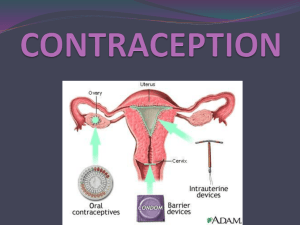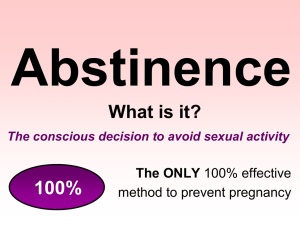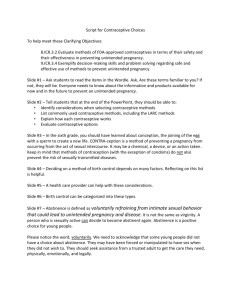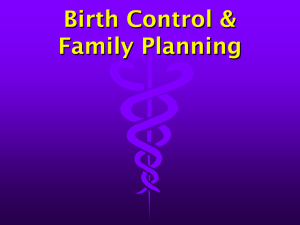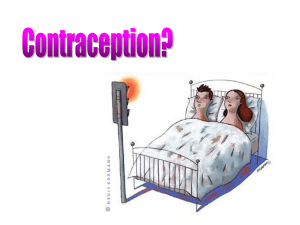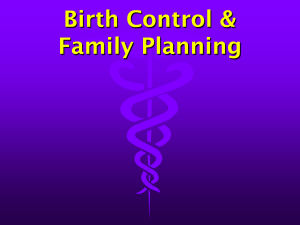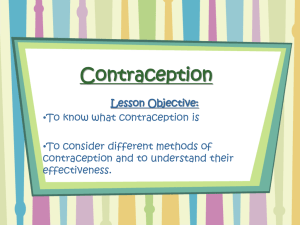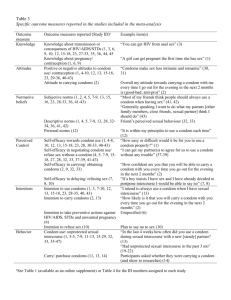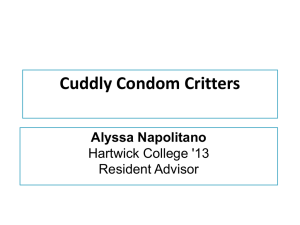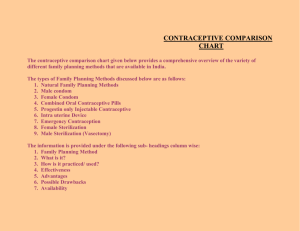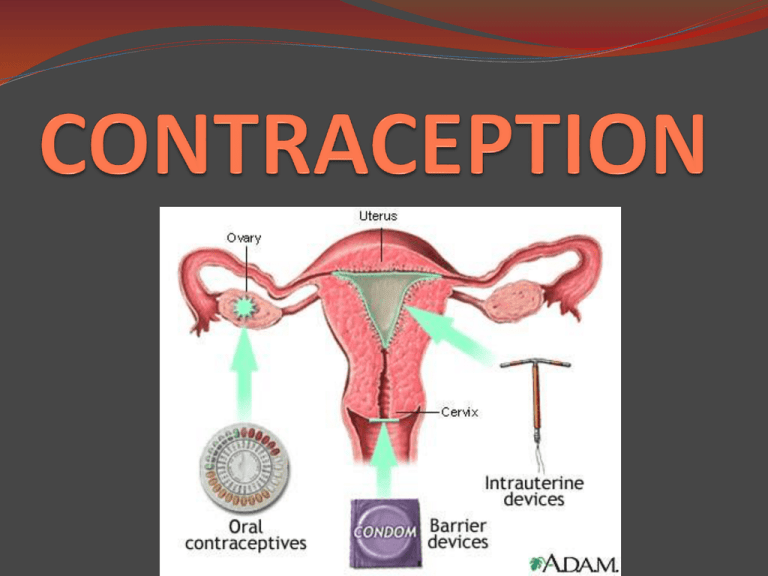
Types of Contraception
1. Barrier contraceptives
2. Hormonal contraceptives
3. Sterilization
Note: No single method of birth control is
the “best” one. Each has its own
advantages and disadvantages.
Abstinence is the only 100% effective way
to prevent pregnancy and STD’s
Barrier Contraceptives
Methods that physically or chemically
block sperm from reaching an egg AND
provide a BARRIER between direct skin to
skin contact
Act as a physical block between you
and your sexual partner
Great for STD protection!
Types: MALE CONDOMS
Male Condom, Cont.
Male Condom:
Male condoms are 82 to 98 percent effective at
preventing pregnancy
Condoms can only be used once
Do not use oil-based lubricants such as massage
oils, baby oil, lotions, or petroleum jelly.They
will weaken the condom, causing it to tear or
break.
Water-based are the best – can prevent breaking
of condom.
Good choices: Latex condoms and polyurethane
Bad choices: Never choose “natural” or
“lambskin”
Female Condom
Female Condom, cont…
Female Condom:
Female condoms are 79 to 95 percent
effective
Worn by the woman, this method keeps
sperm from getting into her body
It can be inserted up to eight hours
before sexual intercourse (though not
necessary)
Dental Dam
Small, thin, square pieces of latex
Used to keep partners' body fluids out of
each other's bodies
Can help to prevent skin-to-skin contact
Placed on the vulva or the anus when the
mouth, lips, or tongue are used to sexually
arouse a partner.
Can also cut a condom open on one side
Hormonal Methods
Methods that prevent the release of
an egg (ovulation)
Prevents a fertilized egg from
implanting in the uterus (prevents
pregnancy).
NO hormonal methods reduce
chances of STD’s!
Oral Contraceptives
Also called “the pill,”
Some contain estrogen, progestin, or mix of
other hormones depending on pill
The pill is 91 to 99 percent effective at
preventing pregnancy.
Prescribed by doctor
A pill is taken at the same time each day
(once a day for three weeks, no pill fourth
week -will get menstrual period)
Birth Control Patch
This skin patch is worn on the lower
abdomen, buttocks, or upper body
The patch is 91 to 99 percent effective at
preventing pregnancy
It releases hormones progestin and
estrogen into the bloodstream
You put on a new patch once a week for
three weeks. During the fourth week, you
do not wear a patch, so you can have a
menstrual period
Vaginal Ring
The birth control ring releases the
hormones progestin and estrogen
It is 91 to 99 percent effective at preventing
pregnancy
Ring goes inside vagina up around your
cervix
You wear the ring for three weeks, take it
out for the week you have your period, and
then put in a new ring
This method does not protect you from
HIV or other STDs.
Birth Control Shot
Every 3 months (or 12 weeks), women
get shots of the hormone progestin
in the buttocks or arm from their
doctor.
It is 94 to 99 percent effective at
preventing pregnancy.
It does not protect you from HIV or
other STDs
Emergency Contraception
Also known as the “morning after pill”
The pills are 75 to 89 percent effective at
preventing pregnancy
Can be taken up to FIVE days AFTER
unprotected sex
Effectiveness decreases after 24 hours
Should NEVER be used as regular birth
control
Emergency contraception should only be
used after no birth control was used
during sex, or if the birth control method
failed, such as if a condom broke
Intrauterine Device
It is placed inside the uterus by a doctor.
99% effective at preventing pregnancy
Copper IUD: Can stay for up to 10 years
Interferes with sperm, fertilization, and
prevents implantation
Hormonal IUD: Can stay for up to 5 years
It releases a small amount of hormone each day
to keep you from getting pregnant.
Sterilization
Vasectomy: This operation is done to
keep a man’s sperm from going to his
penis, so his ejaculate never has any
sperm in it that can fertilize an egg.
Operation is more simple than tying a
woman’s tubes
Sterilization
Tubal ligation or “tying
tubes.”
A woman can have her fallopian tubes
tied (or closed) to stop eggs from being
fertilized
Over time, the ends of your fallopian
tubes could fuse back together, and it
may be possible to get pregnant
Review
If male puts on a condom the wrong way, he should
take it off, and put it on the right way? Yes or no?
NO!!! There could still be pre-ejaculatory semen
(WITH SPERM) on the outside, now heading to the
female….std’s and pregnancy are possible.
GET A NEW ONE!!!!
Review
Put the following in order for the best options in
reducing your chances of STD’s:
A) Male Condom
B) Birth Control Pill
C) Abstinence
Review
Answer:
C) Abstinence
A) Male Condom
ONLY, because
B) Birth Control Pill does NOT protect against STD’s,
only pregnancy!
Review
True or False: A male condom can be used again
FALSE: ONLY ONCE- them remove QUICKLY from
the female, discard, and put another condom on the
penis if he wants to continue to have sex again.
Review
True or False:
Emergency contraception can be taken up to 5 days
after unprotected sex
Review
FALSE!
Emergency contraception can only be taken up to 96
hours (or 5 days) after unprotected sex
Review
True or False: Birth control, when used CORRECTLY
EVERY TIME, is 100% effective
FALSE: Only ABSTINENCE is 100% effective
Review
True or False:
Tubal ligation is an easier procedure for females than a
vasectomy is for males
FALSE: A vasectomy is a much more simple and safe
procedure
Review
Which of the following is not placed INSIDE of a
female:
A) Female Condom
B) IUD
C) Birth Control Patch
D) Vaginal Ring
Review
Correct Answer:
C) Birth Control Patch
Review
An IUD can last for how long (depending on what
type)?
A) 1-4 years
B) 1-4 months
C) 5-10 months
D) 5-10 years
Review
CORRECT ANSWER
D) 5-10 years
Final Question
The birth control shot must be given every _______
months:
A) 2
B) 3
C) 4
D) 5
Final Answer
Correct Answer:
B) 3

